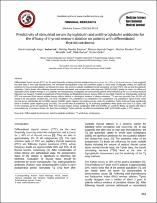| dc.contributor.author | Nasıroğlu İmga, Narin | |
| dc.contributor.author | Işık, Serhat | |
| dc.contributor.author | Navdar Başaran, Mehtap | |
| dc.contributor.author | Ayçiçek Doğan, Berçem | |
| dc.contributor.author | Tuna, Mazhar Müslüm | |
| dc.contributor.author | Ünal, Mustafa | |
| dc.contributor.author | Berker, Dilek | |
| dc.contributor.author | Güler, Serdar | |
| dc.date.accessioned | 2019-07-10T12:08:51Z | |
| dc.date.available | 2019-07-10T12:08:51Z | |
| dc.date.issued | 2016 | en_US |
| dc.identifier.citation | Nasıroğlu İmga, N., Işık, S., Navdar Başaran, M., Ayçiçek Doğan, B., Tuna, M. M., Ünal, M., Berker, D., Güler, S. (2016). Predictivity of stimulated serum thyroglobulin and antithyroglobulin antibodies for the efficacy of thyroid remnant ablation on patients with differentiated thyroid carcinom. Medicine Science, 5(4), 961-966. | en_US |
| dc.identifier.issn | 2147-0634 | |
| dc.identifier.uri | https://hdl.handle.net/11491/3606 | |
| dc.description | research | en_US |
| dc.description.abstract | Differentiated thyroid cancers (DTC) are the most frequently occuring endocrine malignancies and accounts for >= 90% of all thyroid cancers. It was suggested that after total or near total thyroidectomy, the stimulated thyroglobuline (sTg) and quantified uptake in whole body scintigraphy (WBS) are significant predictors for the successful ablation and disease-free status. We aimed to evaluate preablative thyroid stimulating hormone (TSH), sTg and anti-thyroglobulin antibodies (TgAbs) levels, after following thyroid hormone withdrawal, and compare them with diagnostic WBS (DxWBS) uptake for predict the efficacy of radioiodine (RAI) ablation therapy in DTC patients. We retrospectively investigated 100 consecutively patients which followed up for DTC in Ankara Numune Education and Research Hospital at Department of Endocrinology and Metabolism between January 2006 and June 2013. Patients had histologically confirmed DTC and underwent RAI remnant ablation therapy without clinical or radiological evidence of distant metastases. 131I was used generally from 30-200 mCi dosage in all 100 patients. (median dose, 100 mCi). Preablation TSH, preablation sTg, postablation TSH, postablation sTg, postablation TgAbs levels, tumor size and tumor multifocality did not differ between DxWBS uptake negative and positive groups, while the preablation TgAbs level was found significantly lower in DxWBS uptake negative group (p<0.001). The cut-off value of preablation Tg for predicting postablation WBS uptake was found 0.31 ng/mL with 67.4% sensitivity and 54.5% specificity. After RAI remnant ablation therapy, postablation WBS and DxWBS, are useful for follow up patients with high or intermediate risk of persistent disease. We found that preablation TgAbs positivity can effect the postablation WBS and DxWBS uptake in DTC patients | en_US |
| dc.language.iso | eng | en_US |
| dc.publisher | Society of TURAZ BİLİM | en_US |
| dc.relation.isversionof | 10.5455/medscience.2016.05.8483 | en_US |
| dc.rights | info:eu-repo/semantics/openAccess | en_US |
| dc.subject | Differentiated Thyroid Cancers | en_US |
| dc.subject | Anti-Thyroglobulin Antibodies | en_US |
| dc.subject | 131I Whole Body Scintigraphye | en_US |
| dc.title | Predictivity of stimulated serum thyroglobulin and antithyroglobulin antibodies for the efficacy of thyroid remnant ablation on patients with differentiated thyroid carcinoma | en_US |
| dc.type | article | en_US |
| dc.relation.journal | Medicine Science | en_US |
| dc.department | Hitit Üniversitesi, Tıp Fakültesi, Dahili Tıp Bilimleri Bölümü | en_US |
| dc.identifier.volume | 5 | en_US |
| dc.identifier.issue | 4 | en_US |
| dc.identifier.startpage | 961 | en_US |
| dc.identifier.endpage | 966 | en_US |
| dc.relation.publicationcategory | Makale - Ulusal Hakemli Dergi - Kurum Öğretim Elemanı | en_US |


















